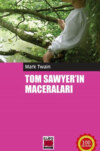Kitabı oku: «30,000 Dollar Bequest and Other Stories», sayfa 7
The Curious Book
Complete
(The foregoing review of the great work of G. Ragsdale McClintock is liberally illuminated with sample extracts, but these cannot appease the appetite. Only the complete book, unabridged, can do that. Therefore it is here printed. – M.T.)
The Enemy Conquered; Or, Love Triumphant
Sweet girl, thy smiles are full of charms,
Thy voice is sweeter still,
It fills the breast with fond alarms,
Echoed by every rill.
I begin this little work with an eulogy upon woman, who has ever been distinguished for her perseverance, her constancy, and her devoted attention to those upon whom she has been pleased to place her affections. Many have been the themes upon which writers and public speakers have dwelt with intense and increasing interest. Among these delightful themes stands that of woman, the balm to all our sighs and disappointments, and the most pre-eminent of all other topics. Here the poet and orator have stood and gazed with wonder and with admiration; they have dwelt upon her innocence, the ornament of all her virtues. First viewing her external charms, such as set forth in her form and benevolent countenance, and then passing to the deep hidden springs of loveliness and disinterested devotion. In every clime, and in every age, she has been the pride of her nation. Her watchfulness is untiring; she who guarded the sepulcher was the first to approach it, and the last to depart from its awful yet sublime scene. Even here, in this highly favored land, we look to her for the security of our institutions, and for our future greatness as a nation. But, strange as it may appear, woman’s charms and virtues are but slightly appreciated by thousands. Those who should raise the standard of female worth, and paint her value with her virtues, in living colors, upon the banners that are fanned by the zéphyrs of heaven, and hand them down to posterity as emblematical of a rich inheritance, do not properly estimate them.
Man is not sensible, at all times, of the nature and the emotions which bear that name; he does not understand, he will not comprehend; his intelligence has not expanded to that degree of glory which drinks in the vast revolution of humanity, its end, its mighty destination, and the causes which operated, and are still operating, to produce a more elevated station, and the objects which energize and enliven its consummation. This he is a stranger to; he is not aware that woman is the recipient of celestial love, and that man is dependent upon her to perfect his character; that without her, philosophically and truly speaking, the brightest of his intelligence is but the coldness of a winter moon, whose beams can produce no fruit, whose solar light is not its own, but borrowed from the great dispenser of effulgent beauty. We have no disposition in the world to flatter the fair sex, we would raise them above those dastardly principles which only exist in little souls, contracted hearts, and a distracted brain. Often does she unfold herself in all her fascinating loveliness, presenting the most captivating charms; yet we find man frequently treats such purity of purpose with indifference. Why does he do it? Why does he baffle that which is inevitably the source of his better days? Is he so much of a stranger to those excellent qualities as not to appreciate woman, as not to have respect to her dignity? Since her art and beauty first captivated man, she has been his delight and his comfort; she has shared alike in his misfortunes and in his prosperity.
Whenever the billows of adversity and the tumultuous waves of trouble beat high, her smiles subdue their fury. Should the tear of sorrow and the mournful sigh of grief interrupt the peace of his mind, her voice removes them all, and she bends from her circle to encourage him onward. When darkness would obscure his mind, and a thick cloud of gloom would bewilder its operations, her intelligent eye darts a ray of streaming light into his heart. Mighty and charming is that disinterested devotion which she is ever ready to exercise toward man, not waiting till the last moment of his danger, but seeks to relieve him in his early afflictions. It gushes forth from the expansive fullness of a tender and devoted heart, where the noblest, the purest, and the most elevated and refined feelings are matured and developed in those may kind offices which invariably make her character.
In the room of sorrow and sickness, this unequaled characteristic may always been seen, in the performance of the most charitable acts; nothing that she can do to promote the happiness of him who she claims to be her protector will be omitted; all is invigorated by the animating sunbeams which awaken the heart to songs of gaiety. Leaving this point, to notice another prominent consideration, which is generally one of great moment and of vital importance. Invariably she is firm and steady in all her pursuits and aims. There is required a combination of forces and extreme opposition to drive her from her position; she takes her stand, not to be moved by the sound of Apollo’s lyre or the curved bow of pleasure.
Firm and true to what she undertakes, and that which she requires by her own aggrandizement, and regards as being within the strict rules of propriety, she will remain stable and unflinching to the last. A more genuine principle is not to be found in the most determined, resolute heart of man. For this she deserves to be held in the highest commendation, for this she deserves the purest of all other blessings, and for this she deserves the most laudable reward of all others. It is a noble characteristic and is worthy of imitation of any age. And when we look at it in one particular aspect, it is still magnified, and grows brighter and brighter the more we reflect upon its eternal duration. What will she not do, when her word as well as her affections and love are pledged to her lover? Everything that is dear to her on earth, all the hospitalities of kind and loving parents, all the sincerity and loveliness of sisters, and the benevolent devotion of brothers, who have surrounded her with every comfort; she will forsake them all, quit the harmony and sweet sound of the lute and the harp, and throw herself upon the affections of some devoted admirer, in whom she fondly hopes to find more than she has left behind, which is not often realized by many. Truth and virtue all combined! How deserving our admiration and love! Ah cruel would it be in man, after she has thus manifested such an unshaken confidence in him, and said by her determination to abandon all the endearments and blandishments of home, to act a villainous part, and prove a traitor in the revolution of his mission, and then turn Hector over the innocent victim whom he swore to protect, in the presence of Heaven, recorded by the pen of an angel.
Striking as this train may unfold itself in her character, and as pre-eminent as it may stand among the fair display of her other qualities, yet there is another, which struggles into existence, and adds an additional luster to what she already possesses. I mean that disposition in woman which enables her, in sorrow, in grief, and in distress, to bear all with enduring patience. This she has done, and can and will do, amid the din of war and clash of arms. Scenes and occurrences which, to every appearance, are calculated to rend the heart with the profoundest emotions of trouble, do not fetter that exalted principle imbued in her very nature. It is true, her tender and feeling heart may often be moved (as she is thus constituted), but she is not conquered, she has not given up to the harlequin of disappointments, her energies have not become clouded in the last movement of misfortune, but she is continually invigorated by the archetype of her affections. She may bury her face in her hands, and let the tear of anguish roll, she may promenade the delightful walks of some garden, decorated with all the flowers of nature, or she may steal out along some gently rippling stream, and there, as the silver waters uninterruptedly move forward, shed her silent tears; they mingle with the waves, and take a last farewell of their agitated home, to seek a peaceful dwelling among the rolling floods; yet there is a voice rushing from her breast, that proclaims victory along the whole line and battlement of her affections. That voice is the voice of patience and resignation; that voice is one that bears everything calmly and dispassionately, amid the most distressing scenes; when the fates are arrayed against her peace, and apparently plotting for her destruction, still she is resigned.
Woman’s affections are deep, consequently her troubles may be made to sink deep. Although you may not be able to mark the traces of her grief and the furrowings of her anguish upon her winning countenance, yet be assured they are nevertheless preying upon her inward person, sapping the very foundation of that heart which alone was made for the weal and not the woe of man. The deep recesses of the soul are fields for their operation. But they are not destined simply to take the regions of the heart for their dominion, they are not satisfied merely with interrupting her better feelings; but after a while you may see the blooming cheek beginning to droop and fade, her intelligent eye no longer sparkles with the starry light of heaven, her vibrating pulse long since changed its regular motion, and her palpitating bosom beats once more for the midday of her glory. Anxiety and care ultimately throw her into the arms of the haggard and grim monster death. But, oh, how patient, under every pining influence! Let us view the matter in bolder colors; see her when the dearest object of her affections recklessly seeks every bacchanalian pleasure, contents himself with the last rubbish of creation. With what solicitude she awaits his return! Sleep fails to perform its office – she weeps while the nocturnal shades of the night triumph in the stillness. Bending over some favorite book, whilst the author throws before her mind the most beautiful imagery, she startles at every sound. The midnight silence is broken by the solemn announcement of the return of another morning. He is still absent; she listens for that voice which has so often been greeted by the melodies of her own; but, alas! stern silence is all that she receives for her vigilance.
Mark her unwearied watchfulness, as the night passes away. At last, brutalized by the accursed thing, he staggers along with rage, and, shivering with cold, he makes his appearance. Not a murmur is heard from her lips. On the contrary, she meets him with a smile – she caresses him with tender arms, with all the gentleness and softness of her sex. Here, then, is seen her disposition, beautifully arrayed. Woman, thou art more to be admired than the spicy gales of Arabia, and more sought for than the gold of Golconda. We believe that Woman should associate freely with man, and we believe that it is for the preservation of her rights. She should become acquainted with the metaphysical designs of those who condescended to sing the siren song of flattery. This, we think, should be according to the unwritten law of decorum, which is stamped upon every innocent heart. The precepts of prudery are often steeped in the guilt of contamination, which blasts the expectations of better moments. Truth, and beautiful dreams – loveliness, and delicacy of character, with cherished affections of the ideal woman – gentle hopes and aspirations, are enough to uphold her in the storms of darkness, without the transferred colorings of a stained sufferer. How often have we seen it in our public prints, that woman occupies a false station in the world! and some have gone so far as to say it was an unnatural one. So long has she been regarded a weak creature, by the rabble and illiterate – they have looked upon her as an insufficient actress on the great stage of human life – a mere puppet, to fill up the drama of human existence – a thoughtless, inactive being – that she has too often come to the same conclusion herself, and has sometimes forgotten her high destination, in the meridian of her glory. We have but little sympathy or patience for those who treat her as a mere Rosy Melindi – who are always fishing for pretty complements – who are satisfied by the gossamer of Romance, and who can be allured by the verbosity of high-flown words, rich in language, but poor and barren in sentiment. Beset, as she has been, by the intellectual vulgar, the selfish, the designing, the cunning, the hidden, and the artful – no wonder she has sometimes folded her wings in despair, and forgotten her heavenly mission in the delirium of imagination; no wonder she searches out some wild desert, to find a peaceful home. But this cannot always continue. A new era is moving gently onward, old things are rapidly passing away; old superstitions, old prejudices, and old notions are now bidding farewell to their old associates and companions, and giving way to one whose wings are plumed with the light of heaven and tinged by the dews of the morning. There is a remnant of blessedness that clings to her in spite of all evil influence, there is enough of the Divine Master left to accomplish the noblest work ever achieved under the canopy of the vaulted skies; and that time is fast approaching, when the picture of the true woman will shine from its frame of glory, to captivate, to win back, to restore, and to call into being once more, the object of her mission.
Star of the brave! thy glory shed,
O’er all the earth, thy army led—
Bold meteor of immortal birth!
Why come from Heaven to dwell on Earth?
Mighty and glorious are the days of youth; happy the moments of the lover, mingled with smiles and tears of his devoted, and long to be remembered are the achievements which he gains with a palpitating heart and a trembling hand. A bright and lovely dawn, the harbinger of a fair and prosperous day, had arisen over the beautiful little village of Cumming, which is surrounded by the most romantic scenery in the Cherokee country. Brightening clouds seemed to rise from the mist of the fair Chattahoochee, to spread their beauty over the the thick forest, to guide the hero whose bosom beats with aspirations to conquer the enemy that would tarnish his name, and to win back the admiration of his long-tried friend. He endeavored to make his way through Sawney’s Mountain, where many meet to catch the gales that are continually blowing for the refreshment of the stranger and the traveler. Surrounded as he was by hills on every side, naked rocks dared the efforts of his energies. Soon the sky became overcast, the sun buried itself in the clouds, and the fair day gave place to gloomy twilight, which lay heavily on the Indian Plains. He remembered an old Indian Castle, that once stood at the foot of the mountain. He thought if he could make his way to this, he would rest contented for a short time. The mountain air breathed fragrance – a rosy tinge rested on the glassy waters that murmured at its base. His resolution soon brought him to the remains of the red man’s hut: he surveyed with wonder and astonishment the decayed building, which time had buried in the dust, and thought to himself, his happiness was not yet complete. Beside the shore of the brook sat a young man, about eighteen or twenty, who seemed to be reading some favorite book, and who had a remarkably noble countenance – eyes which betrayed more than a common mind. This of course made the youth a welcome guest, and gained him friends in whatever condition of life he might be placed. The traveler observed that he was a well-built figure, which showed strength and grace in every movement. He accordingly addressed him in quite a gentlemanly manner, and inquired of him the way to the village. After he had received the desired information, and was about taking his leave, the youth said, “Are you not Major Elfonzo, the great musician – the champion of a noble cause – the modern Achilles, who gained so many victories in the Florida War?” “I bear that name,” said the Major, “and those titles, trusting at the same time that the ministers of grace will carry me triumphantly through all my laudable undertakings, and if,” continued the Major, “you, sir, are the patronizer of noble deeds, I should like to make you my confidant and learn your address.” The youth looked somewhat amazed, bowed low, mused for a moment, and began: “My name is Roswell. I have been recently admitted to the bar, and can only give a faint outline of my future success in that honorable profession; but I trust, sir, like the Eagle, I shall look down from lofty rocks upon the dwellings of man, and shall ever be ready to give you any assistance in my official capacity, and whatever this muscular arm of mine can do, whenever it shall be called from its buried greatness.” The Major grasped him by the hand, and exclaimed: “O! thou exalted spirit of inspiration – thou flame of burning prosperity, may the Heaven-directed blaze be the glare of thy soul, and battle down every rampart that seems to impede your progress!”
The road which led to the town presented many attractions. Elfonzo had bid farewell to the youth of deep feeling, and was not wending his way to the dreaming spot of his fondness. The south winds whistled through the woods, as the waters dashed against the banks, as rapid fire in the pent furnace roars. This brought him to remember while alone, that he quietly left behind the hospitality of a father’s house, and gladly entered the world, with higher hopes than are often realized. But as he journeyed onward, he was mindful of the advice of his father, who had often looked sadly on the ground when tears of cruelly deceived hope moistened his eye. Elfonzo had been somewhat of a dutiful son; yet fond of the amusements of life – had been in distant lands – had enjoyed the pleasure of the world and had frequently returned to the scenes of his boyhood, almost destitute of many of the comforts of life. In this condition, he would frequently say to his father, “Have I offended you, that you look upon me as a stranger, and frown upon me with stinging looks? Will you not favor me with the sound of your voice? If I have trampled upon your veneration, or have spread a humid veil of darkness around your expectations, send me back into the world where no heart beats for me – where the foot of man has never yet trod; but give me at least one kind word – allow me to come into the presence sometimes of thy winter-worn locks.” “Forbid it, Heaven, that I should be angry with thee,” answered the father, “my son, and yet I send thee back to the children of the world – to the cold charity of the combat, and to a land of victory. I read another destiny in thy countenance – I learn thy inclinations from the flame that has already kindled in my soul a stranger sensation. It will seek thee, my dear Elfonzo, it will find thee – thou canst not escape that lighted torch, which shall blot out from the remembrance of men a long train of prophecies which they have foretold against thee. I once thought not so. Once, I was blind; but now the path of life is plain before me, and my sight is clear; yet Elfonzo, return to thy worldly occupation – take again in thy hand that chord of sweet sounds – struggle with the civilized world, and with your own heart; fly swiftly to the enchanted ground – let the night-Owl send forth its screams from the stubborn oak – let the sea sport upon the beach, and the stars sing together; but learn of these, Elfonzo, thy doom, and thy hiding-place. Our most innocent as well as our most lawful desires must often be denied us, that we may learn to sacrifice them to a Higher will.”
Remembering such admonitions with gratitude, Elfonzo was immediately urged by the recollection of his father’s family to keep moving. His steps became quicker and quicker – he hastened through the piny woods, dark as the forest was, and with joy he very soon reached the little village or repose, in whose bosom rested the boldest chivalry. His close attention to every important object – his modest questions about whatever was new to him – his reverence for wise old age, and his ardent desire to learn many of the fine arts, soon brought him into respectable notice.
One mild winter day as he walked along the streets toward the Academy, which stood upon a small eminence, surrounded by native growth – some venerable in its appearance, others young and prosperous – all seemed inviting, and seemed to be the very place for learning as well as for genius to spend its research beneath its spreading shades. He entered its classic walls in the usual mode of southern manners. The principal of the Institution begged him to be seated and listen to the recitations that were going on. He accordingly obeyed the request, and seemed to be much pleased. After the school was dismissed, and the young hearts regained their freedom, with the songs of the evening, laughing at the anticipated pleasures of a happy home, while others tittered at the actions of the past day, he addressed the teacher in a tone that indicated a resolution – with an undaunted mind. He said he had determined to become a student, if he could meet with his approbation. “Sir,” said he, “I have spent much time in the world. I have traveled among the uncivilized inhabitants of America. I have met with friends, and combated with foes; but none of these gratify my ambition, or decide what is to be my destiny. I see the learned would have an influence with the voice of the people themselves. The despoilers of the remotest kingdoms of the earth refer their differences to this class of persons. This the illiterate and inexperienced little dream of; and now if you will receive me as I am, with these deficiencies – with all my misguided opinions, I will give you my honor, sir, that I will never disgrace the Institution, or those who have placed you in this honorable station.” The instructor, who had met with many disappointments, knew how to feel for a stranger who had been thus turned upon the charities of an unfeeling community. He looked at him earnestly, and said: “Be of good cheer – look forward, sir, to the high destination you may attain. Remember, the more elevated the mark at which you aim, the more sure, the more glorious, the more magnificent the prize.” From wonder to wonder, his encouragement led the impatient listener. A stranger nature bloomed before him – giant streams promised him success – gardens of hidden treasures opened to his view. All this, so vividly described, seemed to gain a new witchery from his glowing fancy.
In 1842 he entered the class, and made rapid progress in the English and Latin departments. Indeed, he continued advancing with such rapidity that he was like to become the first in his class, and made such unexpected progress, and was so studious, that he had almost forgotten the pictured saint of his affections. The fresh wreaths of the pine and cypress had waited anxiously to drop once more the dews of Heavens upon the heads of those who had so often poured forth the tender emotions of their souls under its boughs. He was aware of the pleasure that he had seen there. So one evening, as he was returning from his reading, he concluded he would pay a visit to this enchanting spot. Little did he think of witnessing a shadow of his former happiness, though no doubt he wished it might be so. He continued sauntering by the roadside, meditating on the past. The nearer he approached the spot, the more anxious he became. At the moment a tall female figure flitted across his path, with a bunch of roses in her hand; her countenance showed uncommon vivacity, with a resolute spirit; her ivory teeth already appeared as she smiled beautifully, promenading – while her ringlets of hair dangled unconsciously around her snowy neck. Nothing was wanting to complete her beauty. The tinge of the rose was in full bloom upon her cheek; the charms of sensibility and tenderness were always her associates.. In Ambulinia’s bosom dwelt a noble soul – one that never faded – one that never was conquered. Her heart yielded to no feeling but the love of Elfonzo, on whom she gazed with intense delight, and to whom she felt herself more closely bound, because he sought the hand of no other. Elfonzo was roused from his apparent reverie. His books no longer were his inseparable companions – his thoughts arrayed themselves to encourage him in the field of victory. He endeavored to speak to his supposed Ambulinia, but his speech appeared not in words. No, his effort was a stream of fire, that kindled his soul into a flame of admiration, and carried his senses away captive. Ambulinia had disappeared, to make him more mindful of his duty. As she walked speedily away through the piny woods she calmly echoed: “O! Elfonzo, thou wilt now look from thy sunbeams. Thou shalt now walk in a new path – perhaps thy way leads through darkness; but fear not, the stars foretell happiness.”
Not many days afterward, as surrounded by fragrant flowers she sat one evening at twilight, to enjoy the cool breeze that whispered notes of melody along the distant groves, the little birds perched on every side, as if to watch the movements of their new visitor. The bells were tolling when Elfonzo silently stole along by the wild wood flowers, holding in his hand his favorite instrument of music – his eye continually searching for Ambulinia, who hardly seemed to perceive him, as she played carelessly with the songsters that hopped from branch to branch. Nothing could be more striking than the difference between the two. Nature seemed to have given the more tender soul to Elfonzo, and the stronger and more courageous to Ambulinia. A deep feeling spoke from the eyes of Elfonzo – such a feeling as can only be expressed by those who are blessed as admirers, and by those who are able to return the same with sincerity of heart. He was a few years older than Ambulinia: she had turned a little into her seventeenth. He had almost grown up in the Cherokee country, with the same equal proportions as one of the natives. But little intimacy had existed between them until the year forty-one – because the youth felt that the character of such a lovely girl was too exalted to inspire any other feeling than that of quiet reverence. But as lovers will not always be insulted, at all times and under all circumstances, by the frowns and cold looks of crabbed old age, which should continually reflect dignity upon those around, and treat unfortunate as well as the fortunate with a graceful mien, he continued to use diligence and perseverance. All this lighted a spark in his heart that changed his whole character, and like the unyielding Deity that follows the storm to check its rage in the forest, he resolves for the first time to shake off his embarrassment and return where he had before only worshiped.
It could not escape Ambulinia’s penetrating eye that he sought an interview with her, which she as anxiously avoided, and assumed a more distant calmness than before, seemingly to destroy all hope. After many efforts and struggles with his own person, with timid steps the Major approached the damsel, with the same caution as he would have done in a field of battle. “Lady Ambulinia,” said he, trembling, “I have long desired a moment like this. I dare not let it escape. I fear the consequences; yet I hope your indulgence will at least hear my petition. Can you not anticipate what I would say, and what I am about to express? Will not you, like Minerva, who sprung from the brain of Jupiter, release me from thy winding chains or cure me—” “Say no more, Elfonzo,” answered Ambulinia, with a serious look, raising her hand as if she intended to swear eternal hatred against the whole world; “another lady in my place would have perhaps answered your question in bitter coldness. I know not the little arts of my sex. I care but little for the vanity of those who would chide me, and am unwilling as well as shamed to be guilty of anything that would lead you to think ’all is not gold that glitters’; so be not rash in your resolution. It is better to repent now than to do it in a more solemn hour. Yes, I know what you would say. I know you have a costly gift for me – the noblest that man can make—your heart! you should not offer it to one so unworthy. Heaven, you know, has allowed my father’s house to be made a house of solitude, a home of silent obedience, which my parents say is more to be admired than big names and high-sounding titles. Notwithstanding all this, let me speak the emotions of an honest heart; allow me to say in the fullness of my hopes that I anticipate better days. The bird may stretch its wings toward the sun, which it can never reach; and flowers of the field appear to ascend in the same direction, because they cannot do otherwise; but man confides his complaints to the saints in whom he believes; for in their abodes of light they know no more sorrow. From your confession and indicative looks, I must be that person; if so, deceive not yourself.”
Elfonzo replied, “Pardon me, my dear madam, for my frankness. I have loved you from my earliest days; everything grand and beautiful hath borne the image of Ambulinia; while precipices on every hand surrounded me, your guardian angel stood and beckoned me away from the deep abyss. In every trial, in every misfortune, I have met with your helping hand; yet I never dreamed or dared to cherish thy love till a voice impaired with age encouraged the cause, and declared they who acquired thy favor should win a victory. I saw how Leos worshipped thee. I felt my own unworthiness. I began to know jealousy—a strong guest, indeed, in my bosom – yet I could see if I gained your admiration Leos was to be my rival. I was aware that he had the influence of your parents, and the wealth of a deceased relative, which is too often mistaken for permanent and regular tranquillity; yet I have determined by your permission to beg an interest in your prayers – to ask you to animate my dropping spirits by your smiles and your winning looks; for if you but speak I shall be conqueror, my enemies shall stagger like Olympus shakes. And though earth and sea may tremble, and the charioteer of the sun may forget his dashing steed, yet I am assured that it is only to arm me with divine weapons which will enable me to complete my long-tried intention.”










